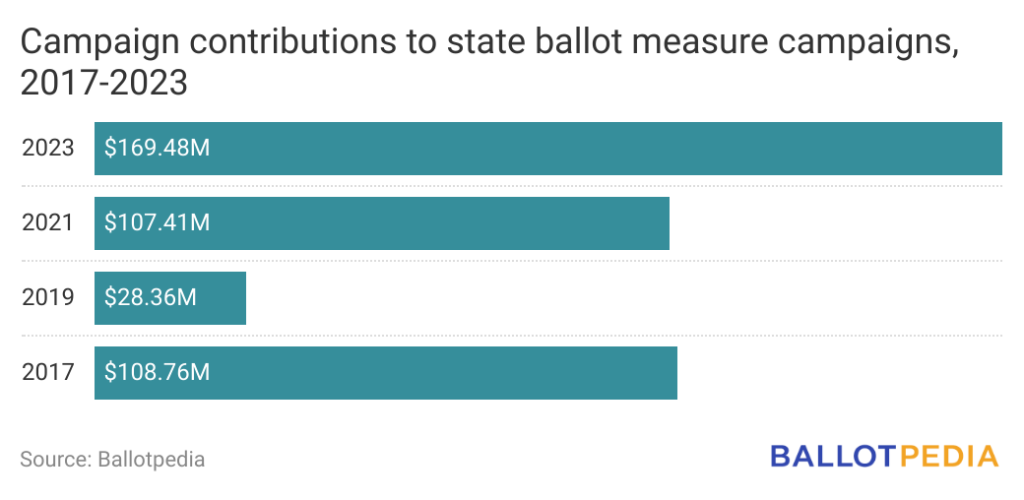A total of $169.48 million has been contributed to either support or oppose 41 statewide ballot measures in eight states in 2023, surpassing the previous three odd-numbered-year election cycles.
Campaigns received $107.41 million in 2021. In 2019, $28.36 million was received. In 2017, $108.76 million was received.
In 2023, one state—Ohio—accounts for 63.23% of the total state ballot measure campaign contributions. About $107.15 million was received in Ohio, including $71.60 million for and against Ohio Issue 1, which would add a state constitutional right to abortion and other reproductive matters to the Ohio Constitution.

What states have seen the most contributions in 2023?
There are eight states with ballot measures in 2023, and six of them have seen contributions to ballot measure campaigns.
- Ohio, with three measures, has seen $107.15 million
- Maine, with eight measures, has seen $48.43 million
- Oklahoma, with one measure in March, saw $5.31 million
- Colorado, with two measures, has seen $5.22 million
- Texas, with 14 measures, has seen $2.88 million
- Wisconsin, with three measures in April, saw $480,000
Ballotpedia did not locate campaign contributions and expenditures in the other two states, Louisiana and New York, with ballot measures in 2023.
Which ballot measures have seen the most contributions?
There are 41 statewide ballot measures in 2023. Seven of those were citizen-initiated, and the other 34 were legislative referrals. About 74% of this year’s contributions were to campaigns supporting or opposing citizen-initiated ballot measures. The three ballot measures to see the most campaign contributions are as follows:
Ohio Issue 1, Right to Make Reproductive Decisions Including Abortion Initiative: The citizen-initiated constitutional amendment would establish a state constitutional right to “make and carry out one’s own reproductive decisions,” including decisions about abortion. Ohio Issue 1 is the most expensive abortion-related ballot measure election following Dobbs v. Jackson Women’s Health Organization, and the most expensive since at least 2009. In 2022, Michigan had the most expensive abortion-related ballot measure at $69.27 million between support and opposition campaigns.
There are six PACs supporting or opposing Issue 1, raising a combined $71.60. Supporters have organized three PACs, receiving $41.71 million. The three largest donors to the support PACs are the Sixteen Thirty Fund ($5.32 million), Lynn Schusterman ($3.50 million), and the Open Society Policy Center ($3.50 million). Opponents also organized three PACs, receiving $29.89 million. The three largest donors are Susan B. Anthony Pro-Life America ($20.74 million), The Concord Fund ($18.00 million), and the Knights of Columbus ($1.00 million).
Ohio Issue 1, 60% Vote Requirement to Approve Constitutional Amendments Measure: There was another constitutional amendment in Ohio titled Issue 1 on August 8, 2023. That Issue 1 would have increased the voter approval threshold for new constitutional amendments to 60%, including the citizen-initiated amendment in November, and made other changes to the initiative process. Voters rejected the ballot measures. Campaigns for and against received a combined $45.58 million. The Protect Women Ohio PAC, which opposes the November Issue 1, supported the August Issue 1, meaning some of the largest donors are the same. There were two other PACs supporting August Issue 1. Together, the three PACs received $23.55 million. The three largest donors were Susan B. Anthony Pro-Life America ($12.50 million), Richard Uihlein ($4.00 million), and the American Policy Coalition ($800,000). Supporters organized the One Person One Vote PAC, which received $22.02 million, including $5.14 million from the Sixteen Thirty Fund, $1.88 million from the Tides Foundation, and $1.12 million from the National Education Association. You can read more about campaign finance for Issue 1 here.
Maine Question 3, Pine Tree Power Company Initiative (2023): Question 3 is a citizen-initiated ballot measure to replace investor-owned transmission and distribution utilities in Maine, including Central Maine Power (CMP) and Versant, with a quasi-public electric utility called the Pine Tree Power Company. Campaigns have received a combined $41.17 million. Opponents of Question 3 received $39.97 million, or 97% of that combined total between campaigns. The largest donors included Avangrid Management Company, the parent company of CMP, with $23.33 million; ENMAX Corp., the parent company of Versant, with $15.93 million; and Clean Energy Matters, with $500,000. Supporters received $1.21 million, including $150,000 from 128 Collective; $116,750 from Susan Bartovics; and $50,000 from Preston-Werner Initiatives.
The largest donor in 2023 to a ballot measure campaign is Avangrid Management Company. The energy business contributed $23.33 million to the Maine Affordable Energy PAC, which opposes Maine Question 3 and supports Maine Question 1. The company also gave $1.00 million to the No Blank Checks PAC, which supports Maine Question 1. Question 1 would require voter approval for certain state entities, municipal electric districts, electrification cooperatives, or consumer-owned transmission utilities, like the potential Pine Tree Power Company, to incur a total outstanding debt that exceeds $1 billion.
Additional reading:







